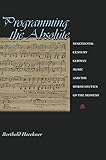Programming the Absolute : Nineteenth-Century German Music and the Hermeneutics of the Moment / Berthold Hoeckner.
Material type: TextPublisher: Princeton, NJ : Princeton University Press, [2022]Copyright date: ©2003Description: 1 online resource (432 p.) : 43 musical scores. 3 tables. 11 halftones. 3 line illusContent type:
TextPublisher: Princeton, NJ : Princeton University Press, [2022]Copyright date: ©2003Description: 1 online resource (432 p.) : 43 musical scores. 3 tables. 11 halftones. 3 line illusContent type: - 9780691227566
- Absolute music
- Music -- Germany -- 19th century -- Philosophy and aesthetics
- MUSIC / Genres & Styles / Classical
- Auschwitz
- Brinkmann, Reinhold
- Buchanan, Herbert
- Danuser, Hermann
- Expressionism
- Frank, Hermann
- Goebbels, Joseph
- Huyssen, Andreas
- Jansen, Gustav
- Kierkegaard, Soren
- Klauwell, Otto
- Lewis, Christopher
- Liszt, Adam
- Malin, Yonathan
- Momentform
- Pederson, Sanna
- Rellstab, Friedrich
- Schleiermacher, Friedrich
- Schopenhauer, Artur
- Szondi, Peter
- Tiedemann, Rolf
- Tomlinson, Gary
- Voigt, Henriette
- Wagner, Cosima
- Walter, Bruno
- Wellbery, David
- Winckelmann, Johann Joachim
- Witz
- Zuidervaart, Lambert
- absolute, as detachment
- actio in distans
- aesthetic appearance
- aesthetics of Argus-eyedness
- apparition
- arabesque
- caesura
- constellation
- criticism, hermeneutic
- dialectics at a standstill
- dying sound
- ekphrasis
- fragment
- hermeneutic circle
- hermeneutics of the moment
- historicism
- ineffability
- modernity
- organicism
- postmodernism
- program music
- truth
- utopia
- 780/.943/09034 21
- ML3854
- ML3854 .H64 2002
- online - DeGruyter
| Item type | Current library | Call number | URL | Status | Notes | Barcode | |
|---|---|---|---|---|---|---|---|
 eBook
eBook
|
Biblioteca "Angelicum" Pont. Univ. S.Tommaso d'Aquino Nuvola online | online - DeGruyter (Browse shelf(Opens below)) | Online access | Not for loan (Accesso limitato) | Accesso per gli utenti autorizzati / Access for authorized users | (dgr)9780691227566 |
Frontmatter -- Contents -- List of Figures and Table -- List of Example -- Preface -- Introduction. MUSICAL MOMENTS AND THE MOMENT OF GERMAN MUSIC -- Chapter One. BEETHOVEN'S STAR -- Chapter Two. SCHUMANN'S DISTANCE -- Chapter Three. ELSA'S SCREAM -- Chapter Four. LISZT'S PRAYER -- Chapter Five. SCHOENBERG'S GAZE -- Chapter Six. ECHO'S EYES -- Notes -- Bibliography -- Index
restricted access online access with authorization star
http://purl.org/coar/access_right/c_16ec
Programming the Absolute discusses the notorious opposition between absolute and program music as a true dialectic that lies at the heart of nineteenth-century German music. Beginning with Beethoven, Berthold Hoeckner traces the aesthetic problem of musical meaning in works by Schumann, Wagner, Liszt, Mahler, and Schoenberg, whose private messages and public predicaments are emblematic for the cultural legacy of this rich repertory. After Romanticism had elevated music as a language "beyond" language, the ineffable spurred an unprecedented proliferation of musical analysis and criticism. Taking his cue from Adorno, Hoeckner develops the idea of a "hermeneutics of a moment," which holds that musical meaning crystallizes only momentarily--in a particular passage, a progression, even a single note. And such moments can signify as little as a fleeting personal memory or as much as the whole of German music. Although absolute music emerged with a matrix of values--the integrity of the subject, the aesthetic autonomy of art, and the intrinsic worth of high culture--that are highly contested in musicology today, Hoeckner argues that we should not completely discard the ideal of a music that continues to offer moments of transcendence and liberation. Passionately and artfully written, Hoeckner's quest for an "essayistic musicology" displays an original intelligence willing to take interpretive risks. It is a provocative contribution to our knowledge about some of Europe's most important music--and to contemporary controversies over how music should be understood and experienced.
Mode of access: Internet via World Wide Web.
In English.
Description based on online resource; title from PDF title page (publisher's Web site, viewed 29. Jul 2022)


